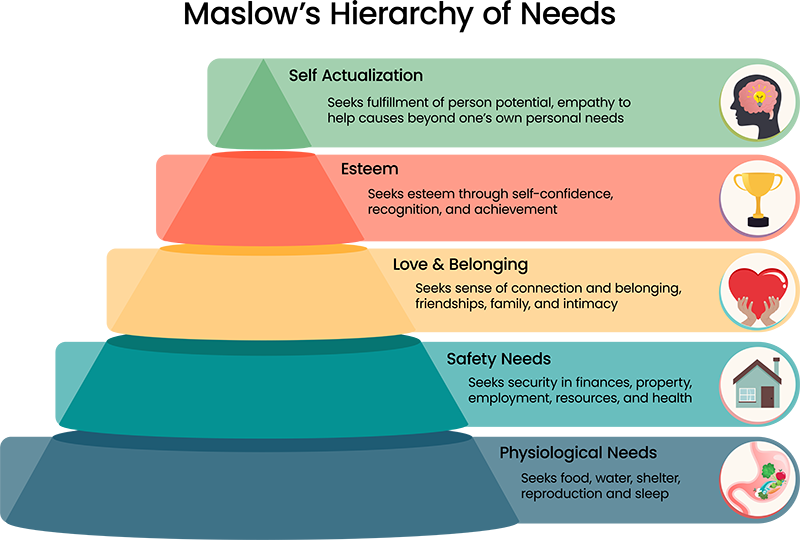Elevating Employee Recognition for CEOs
What motivates people in the workplace? This question has intrigued psychologists and business leaders alike for decades. According to Abraham Maslow, the renowned American psychologist, people are driven by a hierarchy of needs, ranging from basic physiological requirements to self-actualization. While each level of the hierarchy plays a role in an individual’s motivation, it’s the top three categories that are profoundly influenced by employee recognition.
Understanding Maslow’s Hierarchy of Needs
Let’s take a closer look at Maslow’s Hierarchy of Needs, a psychological theory that remains highly relevant in today’s corporate landscape.
 Physiological Needs: At the base of the pyramid are fundamental requirements like food, water, and shelter. In a work context, these needs translate to fair wages and a safe, comfortable workplace.
Physiological Needs: At the base of the pyramid are fundamental requirements like food, water, and shelter. In a work context, these needs translate to fair wages and a safe, comfortable workplace.
Safety Needs: The next level pertains to security and safety. In a job setting, this encompasses job security, health benefits, and a work environment free from physical and emotional harm.
Social Needs: Moving up, we encounter social needs, which involve a sense of belonging, acceptance, and camaraderie. Employee recognition plays a crucial role in meeting these needs by fostering positive relationships and a sense of community within the workplace.
Esteem Needs: The fourth tier encompasses esteem needs, both self-esteem and the esteem of others. Employee recognition directly addresses these needs by validating an employee’s contributions and boosting their self-worth within the organization.
Self-Actualization: At the pinnacle of the hierarchy lies self-actualization, the realization of one’s potential. When employees receive recognition for their accomplishments, they’re more likely to feel empowered to reach for their highest potential.
The Impact of Recognition on Employee Well-being
Recognition, often regarded as the lowest-cost, highest-impact employee benefit, serves as a powerful catalyst for fulfilling the top three needs within Maslow’s Hierarchy. Here’s how:
Social Needs: Recognition creates a sense of belonging and social acceptance. When employees feel appreciated and valued, they are more likely to form strong bonds with their colleagues and the organization as a whole.
Esteem Needs: Being recognized for one’s efforts directly contributes to enhanced self-esteem. It communicates that the employee’s work is not only noticed but also celebrated. This boost in self-worth motivates employees to continue delivering outstanding performance.
Self-Actualization: With their social and esteem needs met, employees are better positioned to strive for self-actualization. Recognized employees are more likely to seek out opportunities for growth and development, both for personal and professional advancement.
The Role of CEOs in Employee Recognition
As a CEO, it’s crucial to understand the profound impact of recognition on your employees’ well-being and motivation. Cultivating a workplace that addresses these needs fosters pride in one’s role and inspires unwavering dedication from your workforce.
At Val-U Solutions, we offer the CARE (Create Award Recognition Environment)® approach, a unique solution designed to elevate employee recognition within your organization. Our approach involves collaborating with vetted providers to tailor a strategic recognition program that aligns with your company’s goals, needs, and values.
In conclusion, recognizing your employees’ achievements isn’t just a feel-good gesture; it’s a strategic move that taps into the very core of their motivation. By investing in employee recognition, CEOs can create a workplace where passion for work thrives, leading to increased engagement, productivity, and, ultimately, success.
Ready to take the next step in fostering a passion for work? Contact us to learn more about our recognition solutions and how we can help you create an award-worthy recognition environment.
